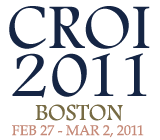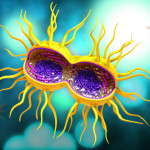 Bristol-Myers Squibb reported encouraging preliminary results from a short study evaluating its oral version of a new class of antiretrovirals (ARVs): an attachment inhibitor currently dubbed BMS-663068 (BMS-068). The data were reported Monday, February 28, by Richard Nettles, MD, of BMS at the 18th Conference on Retroviruses and Opportunistic Infections (CROI) at Boston.
Bristol-Myers Squibb reported encouraging preliminary results from a short study evaluating its oral version of a new class of antiretrovirals (ARVs): an attachment inhibitor currently dubbed BMS-663068 (BMS-068). The data were reported Monday, February 28, by Richard Nettles, MD, of BMS at the 18th Conference on Retroviruses and Opportunistic Infections (CROI) at Boston.
Like the approved ARVs Fuzeon (enfuvirtide) and Selzentry (maraviroc), BMS-068 prevents HIV from entering CD4 cells and thus establishing infection. However, it does so in a different manner than these approved agents. Whereas Selzentry blocks the way HIV interacts with the CCR5 receptor on CD4 cells and Fuzeon prevents the fusion of the virus and cell membranes, BMS-068 acts even earlier in the process—it prevents HIV’s gp120 protein from docking with the CD4 cells’ protein.
Most attachment inhibitors studied in clinical trials thus far need to be injected, as the active drugs are very sensitive and do not make it past gastric juices in the stomach and intestine. Researchers at BMS have found a way to administer its attachment inhibitor orally and presented data at CROI from their first study involving HIV-positive patients.
The study enrolled 50 patients into one of five dosing groups. In Group A, patients took 600 milligrams (mg) of BMS-068 plus 100 mg Norvir (ritonavir), twice a day. In Group B, patients took 1,200 mg BMS-068 plus 100 mg Norvir, once a day. In Group C, patients took 1,200 mg BMS-068 plus 100 mg Norvir, twice a day. In Group D, patients took 1,200 BMS-068 twice a day, plus 100 mg Norvir once a day (with the morning dose of BMS-068). Finally, in Group E, the dose was 1,200 mg BMS-068, twice daily, without Norvir.
Average viral load reductions in the patients—all were either new to treatment or off therapy upon entering the study—were pronounced in all groups, ranging from a 1.2 log drop in Group E to a 1.8 log drop in Group C. Maximum viral load reductions ranged from 1.22 log to 1.78 log, which generally occurred several days after the last dose of the drug.
CD4 increases, ranging from a 23-cell gain in Group E and a 130-cell gain in Group A, were also reported.
BMS-068 was generally well tolerated with no serious adverse events during the brief study. Side effects were generally mild, with rash and headache being the most common.
After conducting an analysis of BMS-068 concentrations in the blood, the researchers concluded that, going forward, the drug can be studied using once- or twice-daily dosing either with or without Norvir. Nettles even suggested that further exploration, at doses lower than those used in this initial Phase IIa study, may be warranted.
On February 16, 2011, the U.S. Food and Drug Administration granted BMS’s request of Fast Track designation for BMS-068, potentially expediting the research and possible approval of the drug. However, additional Phase II and Phase III testing is necessary to prove the drug’s safety and efficacy for the treatment of HIV.






Comments
Comments